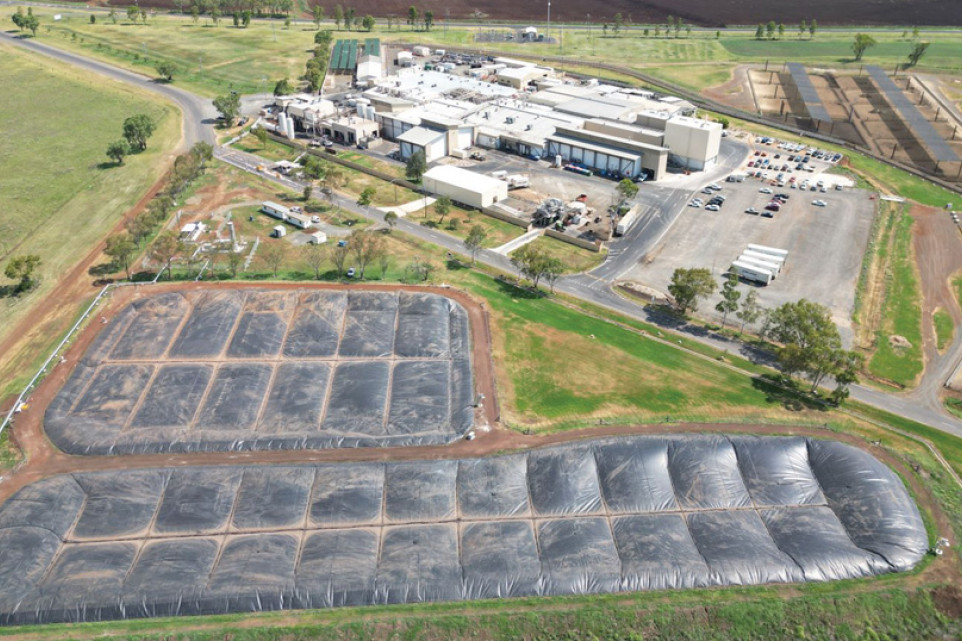Agricultural
9 September, 2024
Beef City’s new bioenergy system
A recently completed bioenergy system installed at JBS Australia’s Beef City processing facility south of Oakey is producing up to 10,000 cubic metres of biogas per day, eliminating the equivalent of 34,000 tonnes of carbon dioxide emissions annually.

JBS has completed the installation and commissioning of the new biogas harvesting system at Beef City, an integrated feedlot and processing facility at Purrawunda, to offset energy requirements on-site.
Biogas is a combination of gases, the predominant one being methane (75 per cent) with the remainder being carbon dioxide.
The completed systems will contribute to a total annual reduction of about 57,000t of carbon dioxide equivalent emissions.
If JBS didn’t cover those lagoons, they would be emitting carbon dioxide.
JBS partnered with AGL-owned biogas handling company Energy360 to install bioenergy infrastructure at Beef City that enables a circular wastewater treatment process.
Two gas-tight pond covers have been installed over pre-existing anaerobic wastewater lagoons, allowing naturally occurring biogas to be captured and redirected for use as a production heat source.
These covers also prevent waste odour from entering the atmosphere.
This biogas is now displacing a significant portion of Beef City’s natural gas requirements.
This provides Beef City with substantial Greenhouse Gas abatement well into
the future, as well as reducing costs by lessening the plant’s reliance on natural gas, the company said.
The additional inclusion of a de-sulphurisation system underneath the lagoon covers has allowed for more oxygen to be introduced, which lessens the production of other hazardous gases.
A similar project was completed at the JBS Dinmore site in 2014.
Professor Bernadette McCabe, Director of the Centre for Agricultural Engineering at the University of Southern Queensland has been following the project.
She says the methane component in biogas will be used to heat boilers, to generate hot water used in processing operations.
“They are reducing their emissions in two ways,” she said.
“Methane is an important greenhouse gas, more potent than carbon dioxide.
“By capturing methane in biogas and using to replace fossil natural gas it is stopped from entering the atmosphere.
“It’s great to see the increasing adoption of this technology in Australia which is proven on the international stage.”
JBS Northern chief operating officer Brendan Tatt said the project exemplified the company’s focus on investing in renewable infrastructure and sustainability projects.
“It’s a win-win design that reuses a naturally occurring waste product to replace a considerable volume of natural gas, which is great for both cost and emissions management,” he said.
Beef City processing plant manager Justin McCormick said the new bioenergy system was already making significant contributions to reducing Beef City’s emissions profile.
“Since commencing operations, the bioenergy system keeps proving its worth at Beef City, as we use more and more biogas each day as a lower carbon energy,” he said.
Daily replacement of LNG has been as high as 10,000 cubic metres of biogas per production day, which significantly lessens our total natural gas consumption and significantly reduces our carbon dioxide equivalent emissions.
“We thank our engineering team and our construction contractors Energy 360 for their expertise and contribution towards building a system that revolutionises our waste management and energy usage,” he said.
“We’re pleased to see it making a tangible impact already.”
AGL Group general manager for electrification and innovation Ryan Warburton, said the project was a testament to the work AGL was doing to provide end-to-end tailored renewable energy solutions to large business customers.
“At AGL, we are committed to supporting our large commercial and industrial customers decarbonise the way they work, with JBS embracing biogas to support their sustainability goals, reduce their emissions and help lower costs,” Mr Warburton said.


